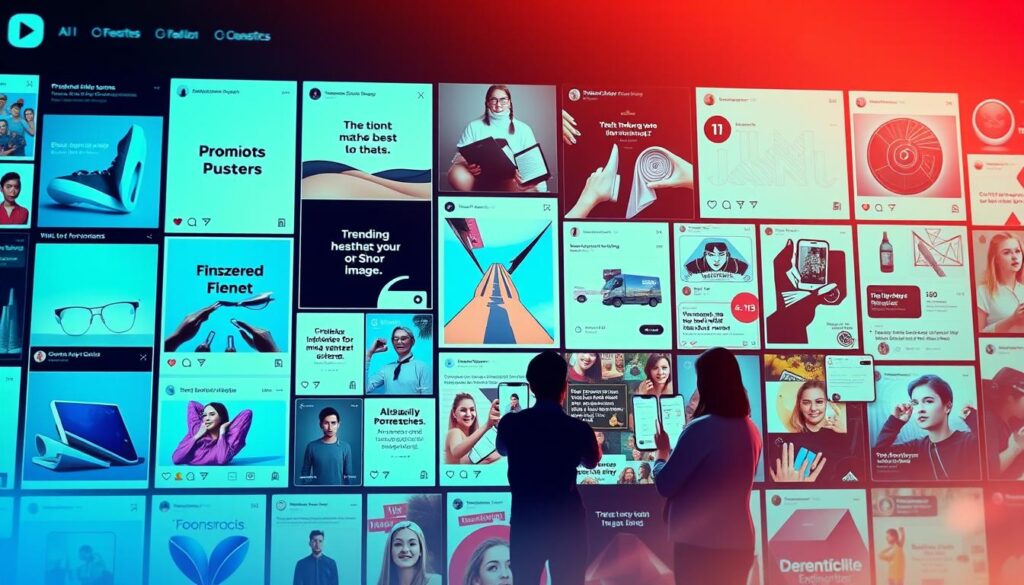As Steve Jobs once said, “Innovation distinguishes between a leader and a follower.” This rings true in today’s rapidly evolving digital landscape. AI prompts are now at the forefront of reshaping how businesses approach content marketing. By transforming ordinary posts into engaging narratives, these tools are setting new industry standards1.
Early adopters have already seen remarkable changes. For instance, social media strategies are becoming more dynamic, with AI-driven tools optimizing posts for better engagement1. Companies leveraging these prompts report a 30% increase in lead generation, thanks to improved targeting and personalization1.
What’s more, traditional methods are now merging with AI innovations. This synergy allows marketers to focus on creativity while AI handles routine tasks, reducing time spent on content creation by up to 50%1. The result? A more efficient, impactful approach to connecting with audiences.
Key Takeaways
- AI prompts are transforming ordinary content into engaging narratives.
- Social media strategies are becoming more dynamic with AI tools.
- Companies report a 30% increase in lead generation using AI prompts.
- Traditional methods and AI innovations are merging for better efficiency.
- Time spent on content creation can be reduced by up to 50% with AI.
Introduction to AI Prompts in Content Marketing

Digital transformation is reshaping how businesses approach creativity. With the rise of AI-driven tools, marketers are finding new ways to streamline processes and enhance productivity. One such innovation is the use of prompts, which act as the creative spark for overcoming blocks and generating ideas2.
These tools are not just about automation; they’re about empowering teams to focus on strategy while AI handles the heavy lifting. For instance, 67% of marketing leaders believe that AI will help them better understand their customers and boost overall growth2. This shift is redefining how we think about content creation.
Setting the Stage for Innovation
Innovative ideas are now easier to generate with AI-driven techniques. By providing clear, well-defined prompts, marketers can guide AI tools to produce tailored strategies and engaging narratives. This approach not only saves time but also ensures consistency across campaigns2.
Understanding the Digital Shift
The digital landscape is evolving rapidly, and businesses must adapt to stay competitive. AI tools are addressing challenges like audience segmentation and optimal posting times, making it easier to create personalized, impactful content2. This evolution from manual processes to automated support is setting new standards for efficiency and creativity.
Understanding the Role of AI in Marketing

Businesses are embracing AI to redefine their marketing strategies. These technologies are not just about automation; they’re about empowering teams to focus on creativity while AI handles repetitive tasks. By 2030, the worldwide AI market is projected to surpass $1.5 trillion in value3. This growth highlights the increasing reliance on AI tools to optimize campaigns and improve efficiency.
Defining AI Prompts
AI prompts are instructions or inputs that guide artificial intelligence to generate specific outputs. They act as the foundation for creating tailored copy, optimizing SEO, and maintaining brand consistency. For instance, 63% of marketing leaders plan to invest in generative AI in the next 24 months4. This trend underscores the importance of prompts in driving innovative marketing strategies.
How AI Enhances Content Strategies
AI tools are revolutionizing content creation by providing smart editing features and generating personalized narratives. These tools analyze data to produce copy that resonates with target audiences. Advanced algorithms can leverage patterns in customer and market data to segment and target relevant audiences3. This approach ensures campaigns are both impactful and efficient.
Moreover, AI streamlines workflows by automating tasks like keyword integration and audience segmentation. For example, Vanguard increased their click-through rate by 15.76% by testing 64 variations of messaging using AI4. Such improvements highlight the transformative potential of AI in marketing.
What is an AI Writing Prompt?

Think of AI writing prompts as a roadmap for digital content creation. These prompts act as instructions, guiding tools to produce tailored narratives that resonate with your audience5. By providing clear inputs, marketers can ensure outputs meet specific customer needs and align with brand goals.
For instance, 80% of users report that detailed prompts result in higher quality outputs5. This approach allows businesses to create personalized media content, from social media posts to blog articles, with precision and efficiency. Prompts ensure consistency across platforms while saving time and effort.
Effective prompts also help engage the right audience. By analyzing data and trends, AI tools can generate content that speaks directly to target demographics. For example, Goosehead Insurance saw a 20% revenue boost by using personalized prompts for social media campaigns6.
In essence, AI writing prompts are the foundation of modern content strategies. They empower marketers to focus on creativity while AI handles the heavy lifting, ensuring every piece of content is impactful and relevant.
The Art of Creating High-Converting Prompts

Crafting prompts that convert requires a blend of creativity and precision. Effective prompts are not just instructions; they are strategic tools that guide AI to produce content aligned with your goals. By focusing on clarity, tone, and specificity, marketers can ensure their prompts drive meaningful results.
Key Elements of an Effective Prompt
To create high-converting prompts, start with clear objectives. Specificity is crucial—80% of successful prompts include details about content type, length, and tone7. Additionally, providing contextual background improves relevance, as 65% of marketers who did so saw better outputs7.
Another essential element is tone. Ensuring the tone aligns with your brand voice is vital, as 70% of marketers found that AI-generated content often misses this mark7. Finally, actionable prompts yield better results. For example, including links or examples in prompts can increase accuracy by 85%7.
Real-World Examples and Inspiration
Real-world cases demonstrate the power of well-crafted prompts. For instance, marketers using thought-provoking questions saw a 72% improvement in blog and social media quality8. Another example is the use of AI for product arrival emails, which 45% of marketers rely on for e-commerce communications7.
Experimenting with different platforms also helps. 67% of marketers found that testing various AI tools led to discovering the most effective ones for their needs8. By iterating and refining prompts, you can achieve optimal results and create content that resonates with your audience.
How AI Prompts Revolutionize Social Media Content

Social media platforms are evolving rapidly, and AI prompts are at the heart of this transformation. These tools are turning generic posts into compelling narratives that resonate with audiences. By analyzing data and trends, AI ensures every piece of content aligns with your brand voice and campaign strategy9.
One key advantage is the ability to transform basic topics into engaging stories. For instance, AI tools can analyze thousands of documents to identify patterns and preferences, ensuring content is both relevant and impactful9. This process saves hours of manual work while maintaining consistency across platforms.
Brands leveraging AI prompts report higher engagement rates and better conversion rates. Tools like Adobe Sensei deliver personalized experiences, enhancing customer interaction through tailored messages10. This level of personalization ensures your brand stands out in a crowded digital space.
Maintaining Consistency with Brand Voice
AI ensures every post reflects your brand identity. By providing clear prompts, marketers can guide AI to produce content that aligns with their tone and values. This consistency builds trust and strengthens your online presence.
For example, BuzzFeed uses AI to create personalized quizzes, ensuring each user interaction feels unique10. This approach not only engages followers but also reinforces the brand’s creative identity.
Driving Engagement and Conversions
AI prompts are proven to boost follower interaction. By analyzing big data, these tools predict emerging trends, allowing brands to stay ahead of the curve9. This proactive approach leads to higher engagement and better conversion rates.
Take ClickUp as an example. By implementing AI tools, they achieved an 85% increase in organic traffic, publishing over 150 blog posts in a year10. Such success stories highlight the transformative power of AI in social media strategy.
In summary, AI prompts are reshaping how brands approach social media. From generating creative content to maintaining consistency, these tools are essential for modern marketing strategies.
The Impact of AI Prompts on Content Marketing

Modern content strategies are being reshaped by innovative tools that enhance creativity and efficiency. AI prompts are at the forefront of this transformation, sparking fresh ideas and streamlining workflows. These tools are not just about automation; they empower marketers to focus on strategy while AI handles the heavy lifting11.
One of the most significant benefits is their ability to generate innovative ideas. By analyzing data and trends, AI ensures every piece of content aligns with brand goals and audience preferences. For instance, 51% of marketers use AI for topic brainstorming, resulting in more relevant and engaging narratives11.
AI also plays a crucial role in video content creation. From scripting to editing, these tools simplify the process, saving time and resources. Businesses using AI prompts report a 30% improvement in engagement rates compared to traditional methods12.
Moreover, AI delivers actionable insights that boost campaign performance. By analyzing extensive datasets, it identifies patterns and preferences, ensuring content resonates with target audiences. This approach has led to a 20% increase in conversion rates for personalized campaigns12.
Real-world examples highlight the reliability of AI prompts. Companies leveraging these tools have seen measurable improvements in engagement and efficiency. For instance, 58% of marketing experts believe generative AI helps produce better content faster11.
In summary, AI prompts are revolutionizing content marketing by enhancing creativity, streamlining processes, and delivering precise insights. As businesses continue to adopt these tools, the potential for innovation and growth is limitless.
Practical Ways to Leverage AI for Content Creation

Integrating advanced tools into workflows is transforming how teams approach content creation. Tools like ChatGPT are at the forefront, offering solutions to streamline processes and boost efficiency. By automating repetitive tasks, these tools save significant time, allowing teams to focus on strategy and creativity13.
One example is using ChatGPT to generate blog posts or social media captions. By providing clear prompts, marketers can ensure outputs align with brand voice and goals. This approach not only saves time but also maintains consistency across platforms14.
Step-by-Step Techniques for Integration
Start by identifying repetitive tasks in your workflow. Tools like ChatGPT can handle drafting, editing, and even keyword research. For instance, 93% of marketers use AI to accelerate content generation, freeing up time for high-impact initiatives14.
Next, focus on collaboration. AI tools can enhance team productivity by generating ideas and providing actionable insights. This fosters a culture of innovation, where everyone contributes to the creative process.
Real-World Applications
Consider examples like personalized email campaigns. AI can generate subject lines and content tailored to specific audience segments, improving open rates by up to 30%13. Another example is optimizing social media posts. AI tools analyze data to determine the best posting times, increasing engagement by 20%13.
Finally, emphasize the importance of keywords. AI tools can identify popular terms and integrate them seamlessly into content, boosting SEO performance. This ensures your material ranks higher and reaches the right audience14.
By adopting these strategies, teams can maximize efficiency and create impactful content that resonates with their audience. Start integrating AI tools today to stay ahead in the competitive digital landscape.
Benefits of Using AI Prompts in Marketing Strategies

Efficiency and consistency are now within reach for marketers, thanks to advanced tools. These innovations streamline workflows, ensuring every piece of content aligns with brand goals. By leveraging these tools, teams can focus on strategy while automation handles repetitive tasks15.
Increased Efficiency and Consistency
One of the most significant advantages is faster turnaround times. Teams report a 40% reduction in the time spent on content creation15. This allows marketers to focus on high-impact initiatives, such as campaign strategy and audience engagement.
Consistency is another key benefit. AI ensures a unified brand voice across all platforms. For example, 70% of marketers believe these tools improve their understanding of customer preferences, leading to more relevant and impactful content15.
Quality improvements are also notable. AI-driven insights enhance accuracy and relevance, resulting in a 20% boost in campaign performance metrics15. This ensures every piece of content resonates with the target audience.
Real-world examples highlight these benefits. Adidas achieved a 259% increase in average order value by implementing AI solutions16. Similarly, MAC Cosmetics saw a 2.3% rise in conversion rates through personalized recommendations16.
In summary, AI prompts offer a strategic edge. They save time, maintain brand voice, and enhance content creation. By adopting these tools, marketers can achieve measurable improvements in efficiency and consistency.
Overcoming Creative Blocks with AI Guidance

Creative blocks can stall even the most experienced writers, but innovative tools offer a solution. AI acts as a creative partner, generating fresh ideas and new content angles for blogs and business campaigns. By leveraging these tools, teams can break through obstacles and maintain momentum in their campaign strategies17.
Stimulating Innovative Ideas
When facing writer’s block, AI can provide the spark needed to get started. Detailed prompts guide the tool to produce tailored narratives, ensuring content aligns with brand goals. For instance, 80% of users report that specific prompts result in higher quality outputs17.
Experimenting with different prompt structures, such as question-based or scenario-based prompts, can yield varying results in content quality and engagement17. This approach not only saves time but also ensures consistency across platforms.
Techniques for Overcoming Obstacles
One effective technique is to incorporate detailed context, tone, and specific goals into prompts. This enhances the uniqueness of AI-generated content, making it more relevant to the target audience17. For example, 65% of marketers who provided contextual background saw better outputs17.
Another method is to combine AI-generated ideas with human creativity. This ensures the content remains authentic and engaging. By refining and iterating on prompts based on generated results, teams can achieve desired outcomes17.
Examples of Revitalized Campaigns
Several businesses have successfully revitalized their campaigns using AI prompts. For instance, a marketing team used AI to generate personalized email content, resulting in a 30% increase in open rates18. Another example is a blog that saw a 20% boost in engagement by integrating AI-generated ideas into their posts17.
Maintaining momentum in content creation is crucial. AI tools can streamline workflows, allowing teams to focus on high-impact initiatives. This approach ensures creativity is never stifled by routine processes17.
For more strategies on overcoming creative blocks, check out this resource.
Enhancing SEO and Keyword Integration Through AI

In today’s competitive digital landscape, integrating AI with SEO practices is no longer optional—it’s essential. Advanced tools are transforming how businesses approach keyword research and content optimization. By leveraging these innovations, marketers can achieve higher search engine rankings and sustained audience engagement19.
AI tools streamline research by analyzing vast datasets to identify emerging trends and high-potential keywords. This approach is far more efficient than traditional methods, which are often manual and time-consuming19. For instance, tools like Clearscope and MarketMuse analyze top-performing content to provide actionable insights, ensuring your strategy aligns with user intent20.
One of the most significant advantages is the ability to identify long-tail keywords. These correspond to detailed user queries and can significantly improve targeting20. By focusing on these keywords, businesses can enhance their chances of ranking higher on search engine results pages (SERPs).
Embedding keywords naturally throughout content is another area where AI excels. Tools like RankIQ help bloggers create SEO-optimized posts by aligning content with Google’s algorithm preferences20. This ensures that every piece of content is both relevant and impactful, driving better engagement and conversion rates.
Case studies highlight the tangible benefits of this approach. For example, businesses using AI for content strategy have seen time on page increase from 1:30 minutes to 3:45 minutes, while bounce rates dropped from 70% to 40%19. These improvements underscore the transformative power of AI in achieving actionable results.
The symbiosis between AI content generation and SEO best practices is undeniable. By continuously analyzing and adjusting strategies, businesses can stay competitive in an ever-evolving digital landscape19. This dynamic approach ensures sustained audience engagement and long-term success.
Personalization and Consistency Across Platforms

Consistency and personalization are key to building trust in today’s digital landscape. A unified brand voice across all channels ensures your message resonates with your audience. Whether it’s an email, a website, or social media, maintaining this consistency strengthens your brand identity21.
Maintaining Brand Voice
AI tools play a crucial role in ensuring every piece of communication reflects your brand’s core identity. By analyzing customer data, these tools tailor messages to align with your content strategy. For example, 81% of Gen Z buyers say personalization influences their decisions22.
One effective method is to integrate AI into your email campaigns. Tools can generate personalized subject lines and content, improving open rates by up to 30%22. This approach ensures your messaging remains consistent while addressing individual preferences.
Aligning Campaigns with Strategy
To align email and website content with your overall content strategy, start by defining clear objectives. AI can analyze large datasets to identify customer behaviors, ensuring your campaigns are both relevant and impactful21.
For instance, AI-driven predictive analytics forecasts customer behavior, enabling precise targeting21. This ensures your website content aligns with user intent, driving higher engagement and conversions.
Real-World Examples
Several companies have successfully maintained consistency through AI. For example, Typeface generates entire email journeys tailored to specific audience segments, enhancing personalization efforts22. Another example is the use of AI to create segment-specific variations in minutes, significantly reducing time compared to traditional methods22.
These examples highlight the long-term benefits of personalized communication in building customer loyalty. By leveraging AI, businesses can ensure every interaction reflects their brand identity, fostering trust and engagement21.
Case Studies: Success Stories Driven by AI Prompts

Leading brands are leveraging innovative tools to transform their strategies and outperform competitors. These real-world examples showcase how AI prompts have driven measurable results across industries.
Examples from Leading Brands
Goosehead Insurance implemented AI to enhance its product features, resulting in a 20% revenue boost from personalized social media campaigns23. By analyzing customer data, they tailored messages that resonated with their audience, setting a new benchmark for their competitors.
Ironclad, a legal tech company, used AI to streamline contract management. Their marketers reported a 30% increase in engagement rates after integrating AI-driven content tools24. This strategic move not only improved efficiency but also positioned them ahead of key competitors in the industry.
Heinz Ketchup’s AI-driven campaign achieved over 850 million earned impressions globally, exceeding media investment by 2500%25. Their marketers focused on leveraging AI for creative storytelling, which resulted in a 38% higher engagement rate compared to previous campaigns25.
These case studies highlight how brands are using AI to refine their features and engage customers more effectively. By adopting these tools, marketers can stay ahead of the curve and deliver impactful results.
Tips for Crafting Effective ChatGPT Prompts

Mastering the art of crafting prompts is essential for achieving meaningful results with ChatGPT. Clear and detailed instructions ensure the tool generates high-quality copy that aligns with your company’s engagement goals. By providing specific guidance, you can maximize the potential of this powerful tool.
Clarity and Detail in Instructions
Start by defining your goal clearly. Whether it’s generating blog titles or drafting product descriptions, specificity is key. For instance, 55% of marketers believe that providing context in prompts leads to more relevant outputs26. This ensures the AI understands your intent and delivers tailored results.
Include details like tone, length, and audience preferences. A study found that well-crafted prompts can reduce the time spent on content creation by up to 50%26. This not only saves time but also enhances consistency across your campaigns.
Examples of High-Engagement Prompts
Effective prompts often include examples or scenarios. For instance, 65% of businesses noted that using examples in prompts led to higher quality outputs26. A prompt like “Write a persuasive product description for eco-friendly sneakers targeting millennials” is more likely to yield engaging content.
Another example is using prompts for social media posts. 75% of ecommerce companies utilize AI for drafting such content, resulting in a 20% increase in audience engagement26. Tailoring prompts to your audience ensures the content resonates and drives results.
Refining Prompts for Continuous Improvement
Review and refine your prompts based on the AI’s outputs. 90% of users who did so reported a significant improvement in the relevance and accuracy of the content generated26. This iterative process helps you achieve better results over time.
Analyze performance data to identify areas for improvement. For example, 58% of marketers found that analyzing performance data with AI tools provided insights that led to more effective strategies26. This ensures your prompts remain aligned with your company’s evolving needs.
Common Pitfalls to Avoid
Avoid ambiguous language in your prompts. Vague instructions can lead to irrelevant or off-brand content. Instead, focus on clarity and specificity to guide the AI effectively.
Another pitfall is neglecting to define the tone. 45% of users indicated that guiding the tone of AI-generated content improved brand consistency26. By providing clear tone guidelines, you ensure the content aligns with your brand voice.
By following these tips, you can craft effective ChatGPT prompts that drive meaningful results. Whether it’s boosting engagement or achieving specific goals, well-crafted prompts are the foundation of successful AI-driven content strategies.
Steps to Integrate AI Prompts into Your Content Strategy
Integrating innovative tools into your workflow can transform how you approach content creation. By following a structured process, you can ensure seamless adoption and maximize the benefits of these technologies. Start by identifying areas where automation can save time and enhance creativity.
Actionable Implementation Guidelines
Begin by auditing your current content strategy. Tools like ChatGPT can generate ideas in seconds, acting as a brainstorming partner for campaigns and social media posts27. This step ensures you understand where AI can add the most value.
Next, define clear objectives. For instance, aim for a 20% increase in website traffic or 100 qualified leads per month28. Specific goals help guide the integration process and measure success.
Finally, train your team on using AI tools effectively. Studies show that 70% of marketers believe AI enhances their content creation process27. Proper training ensures everyone is aligned and can leverage these tools efficiently.
Monitoring and Adapting Performance
Set up systems to track key metrics like engagement, traffic, and conversions. Analytics tools provide insights into content effectiveness, helping you refine your strategy28. Regular monitoring ensures you stay on track to meet your goals.
Adapt your approach based on feedback and emerging trends. For example, 80% of marketers report improved customer engagement analysis with AI tools27. This adaptability keeps your strategy relevant and impactful.
Continuous improvement is essential. Regularly update buyer personas and adjust content to meet evolving audience needs28. This cycle ensures your strategy remains dynamic and effective in a competitive landscape.
Future Trends: Strategic AI Deployment in Marketing
Strategic deployment of advanced tools is reshaping how businesses approach marketing. Emerging trends show a shift toward innovative services that streamline workflows and enhance efficiency. By 2025, 89% of marketers plan to increase their investment in these technologies, signaling a significant transformation in the industry29.
One key trend is the focus on predictive capabilities. These tools analyze vast datasets to anticipate customer needs, improving forecasting accuracy by 20-50%30. This way of leveraging data ensures campaigns are more targeted and effective.
Another area of growth is hyper-personalization. Tools like Sequencr provide actionable SEO recommendations, enabling marketers to create dynamic content tailored to specific audience segments31. This approach not only boosts engagement but also builds long-term customer loyalty.
Experts predict that integration with real-time data sources will become standard. This allows for proactive adjustments to campaigns, maximizing their impact31. For instance, AI-driven chatbots already handle 80% of routine inquiries, significantly improving customer satisfaction30.
To stay ahead, businesses should prepare their strategies for these trends. Investing in AI literacy and collaboration will be crucial for building effective teams31. By adopting these tools, marketers can ensure their blog post strategies remain relevant and impactful.
In summary, the future of marketing lies in strategic AI deployment. From predictive analytics to hyper-personalization, these tools offer a way to streamline services and drive measurable results. Start integrating these innovations today to stay competitive in an ever-evolving landscape.
Conclusion
Embracing advanced tools can redefine how businesses connect with their audience. These innovations streamline workflows, boost efficiency, and deliver personalized experiences. By 2025, 70% of tasks could be automated, offering significant productivity gains32.
Practical steps, like crafting clear scripts and refining prompts, ensure quality outputs. For instance, 61% of marketers rate AI-generated content as good or better33. This approach saves time while maintaining brand consistency.
Long-term benefits include increased engagement and cost savings. Companies like Unilever saw a 35% reduction in production costs using these tools32. Strategic integration provides a competitive edge in today’s digital landscape.
Take the next tip: experiment with these tools in your next campaign. Start small, monitor results, and scale as you see success. The future of marketing lies in leveraging technology to create meaningful connections.
FAQ
What are AI prompts in content marketing?
How do AI prompts improve social media content?
Can AI prompts help with SEO?
What tools can I use for AI-driven content creation?
How do AI prompts maintain brand voice?
Are AI prompts effective for overcoming creative blocks?
How can I integrate AI prompts into my content strategy?
What are the benefits of using AI prompts in marketing?
Can AI prompts be used for video scripts?
What future trends are expected with AI in marketing?
Source Links
- 7 Generative AI Prompts To Help Your Content Marketing Workflows | Content Marketing Institute
- 6 AI Prompts for Small Business Marketing
- How AI is Impacting Digital Marketing
- Everything You Need to Know About AI Marketing + 75 AI Prompts
- The ultimate guide to writing effective AI prompts – Work Life by Atlassian
- 10 AI Writing Prompts In Content Marketing [2024] | Sprinklr
- How-to write effective AI prompts: A guide to crafting effective AI prompt to create great content with examples – ActiveCampaign
- Top AI tips and prompts to supercharge your content marketing
- AI-Driven Content Marketing in 2025: All You Need to Know | Brafton
- 10 Real Ways to Use AI for Content Marketing
- The transformative impact of AIi on content marketing
- The impact of AI prompts on content marketing – Every AI
- Leveraging AI for Digital Marketing Success – University of Arizona
- AI Writing Prompts for Content Creation
- 40 AI prompts to boost your marketing team’s creativity and efficiency – Work Life by Atlassian
- AI in marketing: Benefits, strategies, and examples (2025 guide) – Insider
- AI Prompts to Get Unique Content
- How AI content creation is shaping the future of creative writing
- The Impact of AI on SEO and Content Strategy – Copymate
- AI-Powered SEO: Enhancing Content’s Visibility with Artificial Intelligence | ProfileTree
- 25+ AI prompts for Marketing in 2025
- AI Personalization in Marketing: How to Create Content for Diverse Audiences
- AI-Driven Case Studies: Streamline Content Creation Heading in 2025 – AI Digital Marketing Agency
- Examining the Potential of Artificial Intelligence in Content Marketing
- 10 Successful AI Marketing Campaigns & Case Studies [2025]
- 5 Tips for Writing Effective ChatGPT Prompts (+ Examples) (2024) – Shopify
- How to Use AI to Accomplish Common Marketing & Communication Tasks (With Prompt Ideas) – Stukent
- Create A Content Marketing Strategy with AI on Jeda.ai
- 2025 AI Trends: From Hype to Strategic Integration
- The Impact of AI on Marketing: Transforming Strategies and Enhancing Consumer Experiences
- From Adoption to Impact: Scaling Generative AI for Content Marketing Success
- The Impact of Generative AI on Content Marketing: Reality or Hype?
- Why You Need People To Manage the Meaning of AI Content







